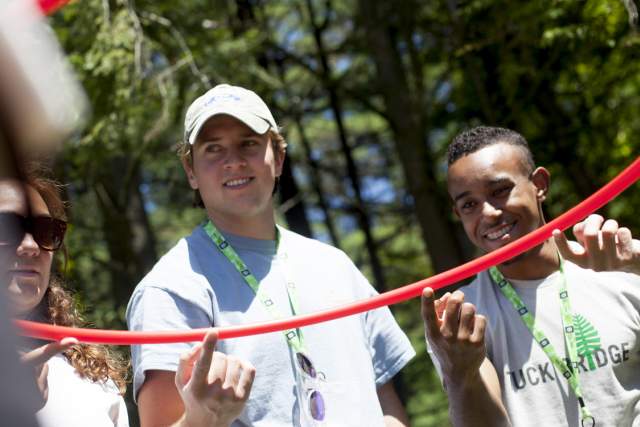Built on a foundation of continual growth and innovation, Tuck’s Business Bridge Program has consistently pushed to find new ways to connect with undergraduate students throughout its history. As it approaches the three-decade mark, Bridge is reaching more students than ever and leading the way for a growing portfolio of undergraduate opportunities at Tuck.
Chief among recent innovations within Bridge is a trio of partnerships with liberal arts institutions—Colby College, Trinity College, and Colgate University. These partnerships, made possible by generous gifts from Tuck alumni, offer undergraduate students at each school the chance to attend Bridge during its January session.
“This is an amazing opportunity not only for Tuck to expand access to Bridge but also for these partner institutions to offer a new space for students to complement their liberal arts and STEM educations with essential business skills,” says Lisa Tedeschi, assistant dean of Undergraduate Education at Tuck.
This is an amazing opportunity not only for Tuck to expand access to Bridge but also for these partner institutions to offer a new space for students to complement their liberal arts and STEM educations with essential business skills.
— Lisa Tedeschi, Assistant Dean, Tuck Undergraduate Education
The Bridge program offered at partner schools resembles the standard January program, featuring identical content and curriculum, the bulk of which is delivered remotely. Distinct to the partnerships, students at each school have ample opportunity for in-person connection. While Tuck faculty conduct course sessions via Zoom, students gather in-person at their home institutions to attend the virtual classes together as a group. Further face-to-face touchpoints come via study group sessions and during Bridge’s signature capstone project in which students apply their learnings by valuing an existing company.
True for all iterations of Bridge, in the program’s final days, students work with Tuck faculty and MBA students to hone their presentations and then deliver their conclusions to in-person guest “investors”—including professionals from major investment banks, international consulting firms, and more. Following the presentations, institutions typically host a networking event, giving participants an additional opportunity to engage with the investors and each other.
“Having guest investors, faculty and staff from Tuck on all three campuses—including myself at Colgate—tremendously enhanced the quality of those last two days,” says Tuck professor Aram Donigian T’08, who will take the reins as Bridge’s faculty director this June. “Everything was in person, and students were able to connect with these amazing business leaders who volunteered their time and expertise. It was a perfect way to close out the program.”

Thanks to new partnerships with liberal arts institutions, undergraduate students gather in-person at their home institutions to attend Tuck Bridge's January session. | Pictured: Students at Trinity College gather for January Bridge. | Photo by Nick Caito, Trinity College
As Bridge continues to expand its reach, Tuck’s overall portfolio of undergraduate programs is growing alongside. In 2025, joining Bridge and TuckLAB—thematic course offerings for Dartmouth undergraduates—is a new, career-oriented program designed specifically for first-year Dartmouth students called Tuck Pathfinders. The concept for Pathfinders grew out of an offering imagined by Dartmouth’s late legendary football coach Buddy Teevens D’79. Recognizing that his players needed tangible skills beyond the field, Teevens partnered with Tuck to provide his team with fundamental financial accounting and team building skills through what was known as the Tuck Business Bootcamp.
“Buddy and I always imagined that the Bootcamp could expand beyond the football program and become broader in scope. We knew it had the potential for greater impact, to reach more students at Dartmouth and set them up for success as they envision their futures and the career paths they may pursue,” Tedeschi says. “Pathfinders is that next phase, building on what the Bootcamp started.”
It’s so important for undergraduate students to be exposed to different career opportunities early on and to hear diverse stories of success. It helps illustrate that every journey is unique, and there isn’t a single, correct path.
— Charles Wheelan D’88
Led by faculty director Charlie Wheelan D’88, and in partnership with Dartmouth’s Center for Professional Development, the program will equip participants with the skills they need to effectively articulate and achieve goals during their collegiate years and when they enter the workforce. In its first year, the program will consist of three modules with sessions exploring topics such as assessing personal strengths, personal finance, negotiating with influence, and effective communication. Pathfinders will also focus on career exploration with students discovering an array of career journeys through engaging sessions with Dartmouth alumni—including television producer and screenwriter Shonda Rhimes D’91. Seventy-five Dartmouth freshman are expected to participate in the program’s first iteration, which will kick off this winter.
“Pathfinders will be an incredible chance for students to think creatively and confidently about their futures,” says Wheelan, who was also recently named faculty director of Tuck’s Center for Business, Government & Society. “It’s so important for undergraduate students to be exposed to different career opportunities early on and to hear diverse stories of success. It helps illustrate that every journey is unique, and there isn’t a single, correct path.”
This article appears in print in the winter 2025 issue of Tuck Today magazine.

